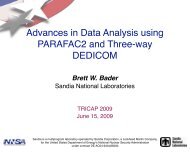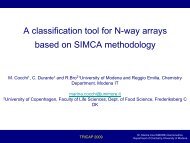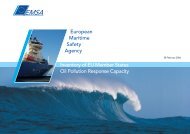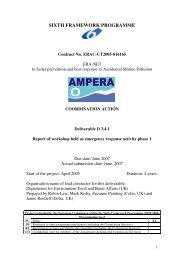Members Handbook 2002 - Centre d'Investigació i ...
Members Handbook 2002 - Centre d'Investigació i ...
Members Handbook 2002 - Centre d'Investigació i ...
You also want an ePaper? Increase the reach of your titles
YUMPU automatically turns print PDFs into web optimized ePapers that Google loves.
OPRC ConventionThe International Convention on OilPollution Preparedness, Response andCo-operation (OPRC) was adopted byan IMO Diplomatic Conference inNovember 1990. It entered into forcein May 1995. In March 2000 it wasextended by way of a Protocol to coverpollution incidents by hazardous andnoxious substances. This Protocol hasnot yet entered into force.The primary objective of OPRC 1990 isto facilitate international co-operationand mutual assistance between Statesand regions when preparing for andresponding to major oil pollutionincidents, and to encourage States todevelop and maintain an adequatecapability to deal with suchemergencies. OPRC 1990 covers oilspills from offshore oil exploration andproduction (E&P) platforms, ports, oilhandling facilities and ships.By ratifying OPRC a State commits itselfto establishing a national system forresponding promptly and effectively tooil pollution incidents. This shouldinclude, as a basic minimum, a nationalcontingency plan; designated nationalauthorities and focal points responsiblefor oil pollution preparedness andresponse; oil pollution reportingprocedures; and arrangements forhandling requests for assistance.In addition, each party to the Convention,either individually or through bi- or multilateralco-operation, and in co-operationwith the oil and shipping industries, portauthorities and other relevant entities, isrequired to ensure:• a minimum level of pre-positionedoil spill combating equipment;• a programme of exercises for oilpollution response organisations;• a training programme for relevantpersonnel;• mechanisms or arrangements to coordinatethe response to an oilpollution incident; and• capabilities to mobilise resources.The operators of ships, E&P facilities, portsand oil terminals are also required toprepare oil pollution emergency plans. Inthe case of ships, this is the same plan thatis required under MARPOL - theShipboard Oil Pollution Emergency Planor SOPEP.The OPRC Convention will potentiallybenefit shipowners since it shouldresult in more effective oil spillresponse around the world. For thisreason ITOPF, together with otherindustry associations, has been cooperatingwith IMO to assist States tomeet the various requirements of theConvention.36






